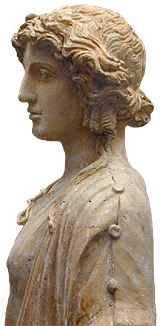The Story of Cloelia
(Livy 2.13. 5-11)
During the early years of the Republic, the Etruscan king Porsinna had
the city of Rome under siege when a young Roman named Mucius was captured
during an assassination attempt. Mucius taunted Porsinna by saying that he was
the first of many Romans who had sworn to kill the king. Porsinna threatened
Mucius with torture if he did not divulge all the details of the plot, but
Mucius thrust his own right hand into the fire to prove that he was impervious
to pain, whereupon Porsinna set him free in recognition of his courage. In fear
of further assassination attempts, Porsinna made a treaty with Rome—the
Etruscans would withdraw the siege but Rome would have to hand over young Roman men
and women as hostages.
 patres C. Mucio virtutis causa trans Tiberim agrum dono dedere,
quae postea sunt Mucia prata appellata. ergo ita honorata virtute, feminae
quoque ad publica decora excitatae, et Cloelia virgo una ex obsidibus, cum
castra Etruscorum forte haud procul ripa Tiberis locata essent, frustrata
custodes, dux agminis virginum inter tela hostium Tiberim tranavit, sospitesque
omnes Romam ad propinquos restituit. quod ubi regi nuntiatum est, primo
incensus ira oratores Romam misit ad Cloeliam obsidem deposcendam: alias haud
magni facere. deinde in admirationem versus, supra Coclites Muciosque dicere id
facinus esse, et prae se ferre quemadmodum si non dedatur obses, pro rupto
foedus se habiturum, sic deditam [intactam] inviolatamque ad suos remissurum.
utrimque constitit fides; et Romani pignus pacis ex foedere restituerunt, et
apud regem Etruscum non tuta solum sed honorata etiam virtus fuit, laudatamque
virginem parte obsidum se donare dixit; ipsa quos vellet legeret. productis
omnibus elegisse impubes dicitur; quod et virginitati decorum et consensu
obsidum ipsorum probabile erat eam aetatem potissimum liberari ab hoste quae
maxime opportuna iniuriae esset. pace redintegrata Romani novam in femina
virtutem novo genere honoris, statua equestri, donavere; in summa Sacra via
fuit posita virgo insidens equo.
patres C. Mucio virtutis causa trans Tiberim agrum dono dedere,
quae postea sunt Mucia prata appellata. ergo ita honorata virtute, feminae
quoque ad publica decora excitatae, et Cloelia virgo una ex obsidibus, cum
castra Etruscorum forte haud procul ripa Tiberis locata essent, frustrata
custodes, dux agminis virginum inter tela hostium Tiberim tranavit, sospitesque
omnes Romam ad propinquos restituit. quod ubi regi nuntiatum est, primo
incensus ira oratores Romam misit ad Cloeliam obsidem deposcendam: alias haud
magni facere. deinde in admirationem versus, supra Coclites Muciosque dicere id
facinus esse, et prae se ferre quemadmodum si non dedatur obses, pro rupto
foedus se habiturum, sic deditam [intactam] inviolatamque ad suos remissurum.
utrimque constitit fides; et Romani pignus pacis ex foedere restituerunt, et
apud regem Etruscum non tuta solum sed honorata etiam virtus fuit, laudatamque
virginem parte obsidum se donare dixit; ipsa quos vellet legeret. productis
omnibus elegisse impubes dicitur; quod et virginitati decorum et consensu
obsidum ipsorum probabile erat eam aetatem potissimum liberari ab hoste quae
maxime opportuna iniuriae esset. pace redintegrata Romani novam in femina
virtutem novo genere honoris, statua equestri, donavere; in summa Sacra via
fuit posita virgo insidens equo.
For help in translating this passage, visit the Perseus web site for a
version
of the Latin text with links to the meaning and morphology of all the
words. Close this window when finished.
 patres C. Mucio virtutis causa trans Tiberim agrum dono dedere,
quae postea sunt Mucia prata appellata. ergo ita honorata virtute, feminae
quoque ad publica decora excitatae, et Cloelia virgo una ex obsidibus, cum
castra Etruscorum forte haud procul ripa Tiberis locata essent, frustrata
custodes, dux agminis virginum inter tela hostium Tiberim tranavit, sospitesque
omnes Romam ad propinquos restituit. quod ubi regi nuntiatum est, primo
incensus ira oratores Romam misit ad Cloeliam obsidem deposcendam: alias haud
magni facere. deinde in admirationem versus, supra Coclites Muciosque dicere id
facinus esse, et prae se ferre quemadmodum si non dedatur obses, pro rupto
foedus se habiturum, sic deditam [intactam] inviolatamque ad suos remissurum.
utrimque constitit fides; et Romani pignus pacis ex foedere restituerunt, et
apud regem Etruscum non tuta solum sed honorata etiam virtus fuit, laudatamque
virginem parte obsidum se donare dixit; ipsa quos vellet legeret. productis
omnibus elegisse impubes dicitur; quod et virginitati decorum et consensu
obsidum ipsorum probabile erat eam aetatem potissimum liberari ab hoste quae
maxime opportuna iniuriae esset. pace redintegrata Romani novam in femina
virtutem novo genere honoris, statua equestri, donavere; in summa Sacra via
fuit posita virgo insidens equo.
patres C. Mucio virtutis causa trans Tiberim agrum dono dedere,
quae postea sunt Mucia prata appellata. ergo ita honorata virtute, feminae
quoque ad publica decora excitatae, et Cloelia virgo una ex obsidibus, cum
castra Etruscorum forte haud procul ripa Tiberis locata essent, frustrata
custodes, dux agminis virginum inter tela hostium Tiberim tranavit, sospitesque
omnes Romam ad propinquos restituit. quod ubi regi nuntiatum est, primo
incensus ira oratores Romam misit ad Cloeliam obsidem deposcendam: alias haud
magni facere. deinde in admirationem versus, supra Coclites Muciosque dicere id
facinus esse, et prae se ferre quemadmodum si non dedatur obses, pro rupto
foedus se habiturum, sic deditam [intactam] inviolatamque ad suos remissurum.
utrimque constitit fides; et Romani pignus pacis ex foedere restituerunt, et
apud regem Etruscum non tuta solum sed honorata etiam virtus fuit, laudatamque
virginem parte obsidum se donare dixit; ipsa quos vellet legeret. productis
omnibus elegisse impubes dicitur; quod et virginitati decorum et consensu
obsidum ipsorum probabile erat eam aetatem potissimum liberari ab hoste quae
maxime opportuna iniuriae esset. pace redintegrata Romani novam in femina
virtutem novo genere honoris, statua equestri, donavere; in summa Sacra via
fuit posita virgo insidens equo.